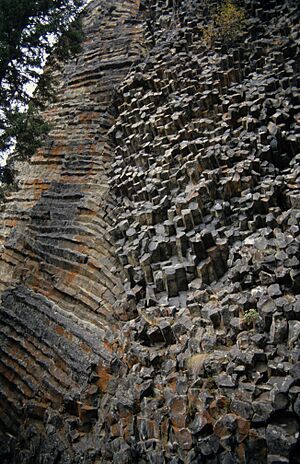White Horse Bluff facts for kids
Quick facts for kids White Horse Bluff |
|
|---|---|
| Highest point | |
| Elevation | 775 m (2,543 ft) |
| Geography | |
| Location | British Columbia, Canada |
| Parent range | Shuswap Highland |
| Geology | |
| Age of rock | Pleistocene |
| Mountain type | Subaqueous volcano |
| Last eruption | 500,000 years ago |
| Climbing | |
| Easiest route | Trail from Green Mountain Road |
White Horse Bluff is a special kind of volcano located in Wells Gray Provincial Park in British Columbia, Canada. It's a unique natural spot worth exploring! This bluff stands tall at 775 meters (about 2,543 feet) above sea level.
Contents
How White Horse Bluff Formed
White Horse Bluff has an amazing story about how it came to be. It's a great example of how powerful nature can be!
Volcano Under Water
About 500,000 years ago, a huge lake filled the area where White Horse Bluff is now. This lake was held back by a natural dam made of hardened lava. White Horse Bluff actually erupted underneath this ancient lake!
When the hot lava hit the cold lake water, its outer layers cooled super fast. Then, water seeped into the still-hot lava inside, causing big explosions. As more lava and rock bits piled up, it formed the bluff we see today.
Amazing Rock Formations
Over time, glaciers and melting ice carved away parts of the bluff. This revealed cool rock features called dykes. These dykes look like giant hands plastered blobs of lava onto the cliff face.
One special spot is called the Rock Roses. These are unique rock columns. Most columnar basalt rocks stand straight up, like organ pipes. But the Rock Roses lie flat, with their ends pointing out, a bit like tiles on a shower wall.
If you walk about 50 meters (164 feet) further west, the columns suddenly change direction. They start to look like the wall of a log cabin! The Rock Roses formed when the hot, melted lava in the dykes touched the older, cooler rocks around them.
Visiting White Horse Bluff
You can explore White Horse Bluff and see its unique features up close. It's a great place for an outdoor adventure!
How to Get There
There's a hiking trail that starts from Green Mountain Road. This road is off the main Clearwater Valley Road, also known as Wells Gray Park Road. It takes about 1.5 hours to hike to the top of White Horse Bluff.
You can also see White Horse Bluff from the Clearwater River Road. This road is on the opposite, or west, bank of the Clearwater River.
The History of White Horse Bluff
White Horse Bluff has some interesting stories and history connected to it.
The White Horse Legend
No one is completely sure how White Horse Bluff got its name. But a popular story comes from the First Nations people. It's about a special white horse.
Long ago, some horses, including a beautiful white one, grazed near the Clearwater River at the base of the bluff. When it was time to move the horses for winter, the white horse was missing. But in the spring, it was found grazing right at the top of the bluff! It had somehow climbed up from the river and survived the whole winter on its own.
The Longhouse Fishing Camp
In the late 1940s, a couple named Mac and Cecile McDiarmid built a fishing camp at the foot of White Horse Bluff. They called it "The Longhouse" because it was 12 meters (about 39 feet) long and 5 meters (about 16 feet) wide. Today, only the ruins of this camp remain.
The McDiarmids eventually ran four fishing camps along the river. Their main home was Trophies Lodge on Clearwater Valley Road. For 25 years, starting in 1945, hundreds of guests enjoyed wilderness vacations and the amazing fishing in the Clearwater River.
Nature's Refrigerator
Around 1950, a guest at The Longhouse noticed a cold breeze coming from cracks near the base of White Horse Bluff. The McDiarmids dug out a small cave, about a meter (3 feet) deep and tall enough to stand in.
This natural "refrigerator" was a huge luxury! It kept ice frozen even on the hottest summer days. It's still there today. In September 2014, the temperature at its entrance was measured at 5 degrees Celsius (41 degrees Fahrenheit).
 | Stephanie Wilson |
 | Charles Bolden |
 | Ronald McNair |
 | Frederick D. Gregory |


